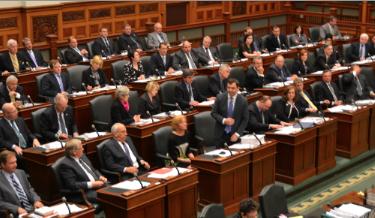
Progressive Conservative Leader Tim Hudak stands with his entire caucus to vote against Bill 13. Credit: Andrea Houston
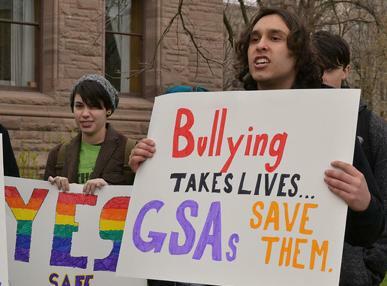
Students Leanne Iskander and Christopher Mckerracher fight for GSAs at Queen's Park. Credit: Andrea Houston (file photo)
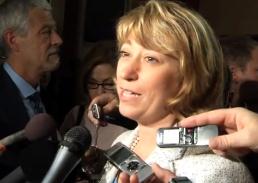
Education Minister Laurel Broten takes questions from media after the vote. Credit: Screencap
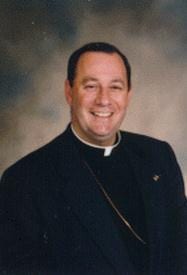
Fred Collie, bishop of the Thunder Bay Diocese. Credit: Courtesy photo
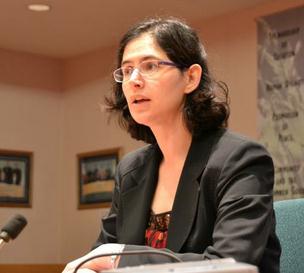
Noa Mendelsohn Aviv, the Canadian Civil Liberties Association's equality program director. Credit: Andrea Houston (file photo)
While the Liberals and New Democrats celebrated the passing of Bill 13 on June 5, many Progressive Conservatives expressed pride that their entire caucus voted unanimously against the anti-bullying legislation.
After the vote, Leader Tim Hudak refused to answer questions about the bill, instead changing the subject to jobs. Hudak called Bill 13 “a distraction” created by Premier Dalton McGuinty to avoid talking about the economy. He said the PCs were interested only in supporting their own legislation, Bill 14, which did not include any provisions to support queer youth.
“You’re asking me about which names principals should be giving clubs in schools? What’s the big issue in the province? Our economy is heading backwards. Our province is bankrupt. You folks are asking me questions about names?”
Hudak refused to say how he plans to explain to his constituents, especially moderate PC voters, why he voted against legislation to protect youth.
Education Minister Laurel Broten says the PCs missed an opportunity to stand up against bullying and prove they support youth and want to help create safe and accepting schools.
The passage of Bill 13, the Liberals’ Accepting Schools Act, is the culmination of more than a year of activism by students and supporters. The issue began when Xtra revealed in 2011 that publicly funded Catholic schools in Ontario were blocking students who wanted to form gay-straight alliance (GSA) support groups. Students demanding GSAs in Catholic schools have repeatedly been overruled by administrators and forced to create ambiguous names for their groups.
While Ontario’s fight over GSAs unfolded, the larger issue of bullying exploded in North America, dominating front pages in Canada, especially after gay Ottawa student Jamie Hubley committed suicide in October. Hubley had been trying to start a rainbow alliance at his school.
The bill, which passed by a vote of 65 to 36, has been hotly debated at Queen’s Park for months. The legislation is the result of the heroic efforts of students like those from St Joseph Catholic School in Mississauga.
“Being part of the group that has been fighting for this has really changed all of our lives,” Mckerracher says.
While he did not plan to spend his Grade 11 year fighting for rights, Mckerracher says, he did what felt right. “I saw this fight as a requirement, something I had to do, not something I wanted to do.”
School administrators banned the St Joe’s students from putting up rainbow posters and threatened them with disciplinary action when they tried to start a gay support group. The students also endured religious bullying from their peers.
“These trustees and Catholic bishops have no idea what it’s like to be a high school student, especially a queer high school student,” Mckerracher says. “We just want a safe group that we can hang out in and talk about our problems.”
NDP Leader Andrea Horwath says she is looking forward to the implementation phase, which “might be challenging.” She says it’s important that the government keep the focus on young people – protecting at-risk youth is not “a distraction.”
Horwath says Catholic school boards must abide by the law by offering supports, such as GSAs. “I’m confident all school boards are going to follow the letter of the law. That is what I expect of them and that’s what I expect will happen.”
Meanwhile, the official statement from Catholic trustees states that there is “no intention at this time” to pursue any legal challenges against Bill 13.
But behind the scenes, Catholic school board trustees and bishops are holding emergency meetings to draft a strategy. Xtra has obtained memos that signal that administrators on Catholic school boards are already preparing ways to get around the legislation.
One memo, from a June 4 teleconference between the Dufferin-Peel Catholic District School Board (DPCDSB) and the Ontario Catholic School Trustees’ Association board, states that Catholic schools will make GSAs a “subset” of another group, and all group discussion must be “in keeping with Catholic teaching.”
The trustees state that they plan to continue to adhere to the “Respecting Difference” guidelines, which state that the Pastoral Guidelines to Assist Students of Same-Sex Orientation will be used to guide group discussion. The guidelines, based on the Catholic catechism, state gay people are “intrinsically disordered” and “gravely depraved.”
The memo notes, “The Respecting Difference Resource created for Catholic schools provides guidelines for ensuring that student-led groups to combat bullying reflect Catholic values and adhere to Ministry guidelines. I would point out that a group of students in a GSA may be a subset of a larger group such as a ‘Respecting Difference’ or ‘Open Arms’ group. As there are various names currently being used in Catholic schools, the deliberation will occur at the local level.”
Mckerracher, whose school is part of the DPCDSB, vows to be the first to speak up and take his school board to court if his principal makes the GSA a subset of another group. “That’s just a new way to silence youth. To have the audacity to try and deny us a group when we have the government’s backing is ridiculous.”
Ontario GSA Coalition lawyer Doug Elliott says that if Catholic boards “driven by the position of the Vatican” think they have found a loophole in the legislation to continue denying GSAs, they will most certainly find themselves defending that position in court.
“If the schools try to play games with kids, like they did with Leanne, the law is clear. We won’t put up with any of that crap come September,” he says. “If you’re not complying with the law, then we’re going to take you to court. It’s that simple.”
The plan by Catholic trustees to find a way around the legislation was echoed by Fred Collie, the bishop of the Thunder Bay Diocese, who pledged there will be a “Catholic component” to clubs, as reported by the Kenora Daily Miner. Schools will continue to teach that homosexuality is wrong and gay people are “sinful” and “immoral,” he said.
“We’re going to say the Catholic Church is not going to endorse or support homosexual lifestyles because we don’t see it as a proper lifestyle or a morally good lifestyle for people,” Collie continued.
Noa Mendelsohn Aviv, a lawyer and equality program director with the Canadian Civil Liberties Association, says Bill 13 guarantees students the right to feel safe and accepted at school. If the religious message from Catholic educators is making students feel unsafe, shameful or humiliated, the doctrine itself may be challengeable in a court, she says.
“When doctrine or policy is being used in a discriminatory fashion, including creating a poisoned environment for vulnerable young people, then yes, I think that would be challengeable,” she says.
Mendelsohn Aviv notes that McGuinty made it clear when he said the provincial government is in charge of running Ontario schools, not the Catholic Church.
After the vote on Bill 13, Broten declared, “The debate is over” on whether or not students can name their clubs “gay-straight alliance,” promising to “monitor schools closely” during implementation.
“I have been very clear. All schools, whether Catholic or public, will be supportive places for all students,” Broten said.
Once students form GSAs in Catholic schools in September, Mendelsohn Aviv says lawyers will be watching closely. “There is reason to be extremely vigilant about how they are being controlled and how much they are able to exercise their basic rights, like freedom of association. I don’t think Bill 13 resolved all that.”
Cardinal Thomas Collins, the archbishop of Toronto and president of the Assembly of Catholic Bishops, which writes Catholic curriculum, has also publicly opposed Bill 13 and recently held a news conference to say GSAs go against Catholic teaching.
Elliott says Collins “overplayed his hand” when he came out against GSAs. “He tried to play the victim. He tried to give people the idea that he really cared about the kids. Public opinion turned against him very quickly and very hard. I don’t just mean non-Catholic. Moderate Catholics were horrified by his position.”
And while politicians may not be prepared to discuss the public funding of Catholic schools, many Ontarians are now talking about it. “The debate has started,” Elliott says.
The number of Ontarians who want to scrap $7 billion in taxpayer support for separate schools is growing and now outnumbers those who favour it, according to a new Forum Research poll. The poll found 48 percent of Ontario residents disagreed with taxpayer support of Catholic schools, while 43 percent thought public funding should continue. Eight percent were unsure.
Kevin Smith, spokesperson for the Canadian Secular Alliance, a member of the Ontario GSA Coalition, says it’s time the government moved to one secular, publicly funded school system.
“People are tired of hearing about this discrimination,” he says. “Public sentiment in favour of defunding Catholic schools is spiralling higher.”
Ontario Green Party Leader Mike Schreiner says his party is alone in taking a public position advocating for one school system. “The public wants to have a conversation about whether it’s appropriate that we fund one religious school to the exclusion of all others. That’s an equity issue. It’s a fairness issue. It’s a fiscal responsibility issue. And, at the end of the day, it’s a quality-of-education issue.”
Catholic trustees leaked memo stating strategy to go around Bill 13 Leaked memo from Ontario Catholic trustees on Bill 13
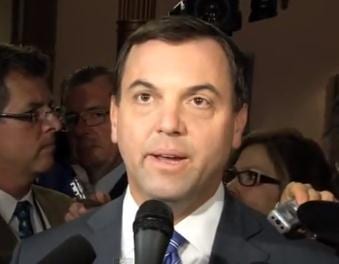
 Why you can trust Xtra
Why you can trust Xtra


